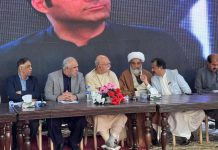ISLAMABAD : The Supreme Judicial Council (SJC) has decided to widen consultation on a letter written by six judges of Islamabad High Court (IHC), accusing the intelligence agencies of interference in judicial affairs. The decision was taken during the meeting of top judicial body under the chairmanship of Chief Justice of Pakistan (CJP) Justice Yahya Afridi, said a press release issued by the Supreme Court. The meeting was attended by Justice Mansoor Ali Shah, Justice Munib Akhtar, IHC Chief Justice Aamer Farooq and Balochistan High Court Chief Justice Muhammad Hashim Kakar. According to the press release, the council discussed the agenda items regarding amendments to the code of conduct of judges under Article 209(8) of the Constitution and letter of six judges of Islamabad High Court. “The Council considered different options and modalities in this regard and decided to widen the consultation on the subject as the code applies to the heads of different institutions in addition to judges and decided to take up the matter in the next meeting once again,” it stated. On March 25, a letter of six judges of the IHC came to surface wherein they had demanded former Chief Justice of Pakistan (CJP) Justice Qazi Faez Isa to convene a Judicial Convention to consider the matter of interference in judicial functions, or intimidation of judges in a manner that undermines independence of the judiciary. The IHC judges — who wrote the letter to the SJC — include Justice Mohsin Akhtar Kiyani, Justice Tariq Mehmood Jahangiri, Justice Babar Sattar, Justice Sardar Ejaz Ishaq Khan, Justice Arbab Muhammad Tahir, and Justice Saman Fafat Imtiaz. The letter emerged days after the Supreme Court declared the removal of former IHC Justice Shaukat Aziz Siddiqui illegal, directing that he may now be considered as a retired judge. The verdict noted that the SJC proceeded against Justice Siddiqui on the “assumption that the truth or falseness of the allegations levelled” by the former judge was “irrelevant”. On Nov 2, The News reported that the IHC judges held a meeting with CJP Afridi and expressed their reservations over the problems they face while discharging judicial functions. Although, there was no official confirmation regarding the development, however, it was learnt that CJP Afridi, after taking oath of his office, had held a meeting with IHC Chief Justice Aamer Farooq, who is also the chairman of the high court’s administrative committee. Meanwhile, the top judicial body — in today’s meeting — also examined ten complaints against the judges under Article 209 of the Constitution filed by different people and held that “no substantial evidence has been adduced by the complainants, therefore the Council has filed those complaints.” The Council also discussed in detail the issue of rule-making of the council and establishment of its secretariat. It agreed to the proposal of registrar and decided that rule making process of the council should be undertaken and draft should be placed before the council in the next meeting. The JCP authorised CJP Afridi to hire the services of a competent individual with proven ability to work as secretary of the council for a period of 3 months who would be tasked to assist the council in conducting its meetings, oversee rule making exercise, and firm up infrastructure and human resource requirements of the Council’s secretariat. Furthermore, the SJC decided to hold regular meetings on monthly basis in future to clear the backlog on fast track. On the other hand, CJP Yahya Afridi also chaired the second meeting of the Judicial Commission of Pakistan constituted under the recently-enacted 26th Constitutional Amendment to consider a single point agenda of formation of a constitutional bench within the Sindh High Court. It was attended by Justice Syed Mansoor Ali Shah, Justice Munib Akhtar, Justice Ameen-ud-Din Khan and Justice Jamal Khan Mandokhail Justice Muhammad Shafl Siddiqui, SHC Chief Justice, Mansoor Usman Awan, Farooq H Naek; Senator Shibli Faraz, MNA Sheikh Aftab Ahmad, Omar Ayub, Roshan Khurshid Barucha, Zia ul Hassan Lanjar, member of Sindh Bar Council.























